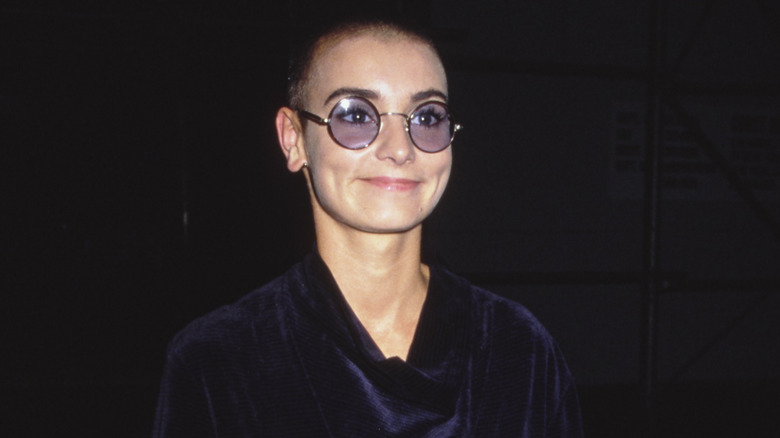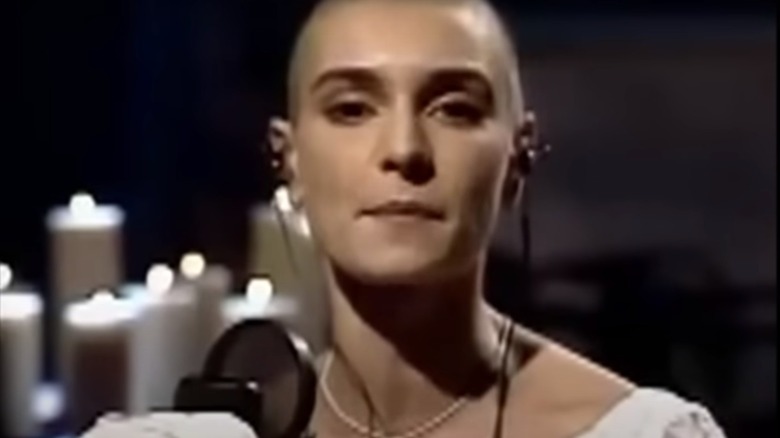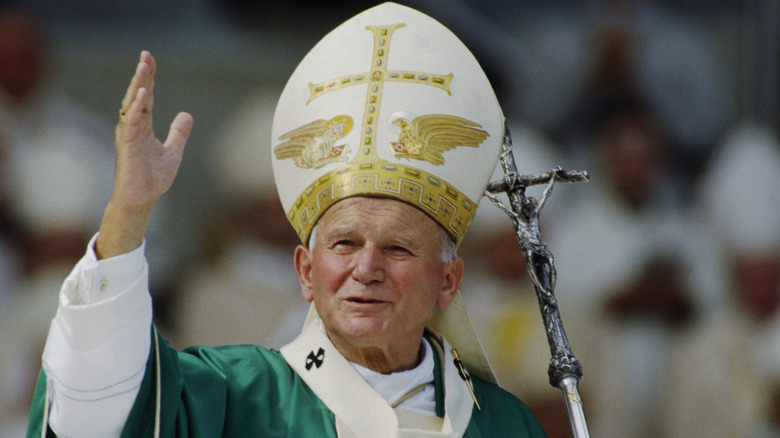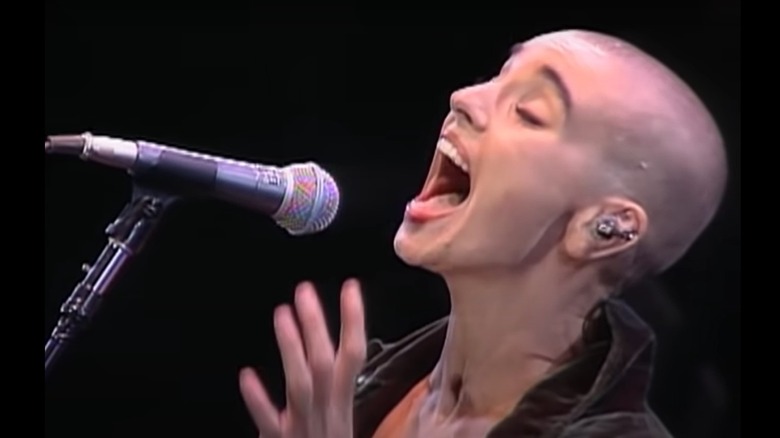How Sinead O'Connor's Infamous SNL Appearance Led To A Lifetime Ban
In 1992, Sinéad O'Connor made history on "Saturday Night Live" — and earned a lifetime ban from the show for taking aim at Pope John Paul II and the Catholic Church.
The outspoken singer performed an a cappella rendition of Bob Marley's song "War." Though Marley's lyrics are more rooted in the conflict that racism creates among humanity, O'Connor honed in on his claims of overcoming evil for her planned protest. Before taking the stage, Far Out Magazine says her rehearsals didn't reveal her actual plans — she held up an image of a refugee child, nothing more. But during her performance of the song, the singer ended by holding up a picture of Pope John Paul II — a protest of the widespread sexual abuse of children that was conducted within and hidden by the Catholic Church — and tearing it to pieces as she just as she sang the word "evil" in Marley's line, "We have confidence in good over evil."
According to Far Out Magazine, NBC Vice-President of Late Night Rick Ludwin said that he "literally jumped out of [his] chair" after seeing the stunt.
Supporters and enemies
The blowback to Sinéad O'Connor's pope-pictured-tearing performance happened almost immediately when she left the stage that night in 1992. As O'Connor wrote in her 2021 memoir "Rememberings," "When I walk backstage, literally not a human being is in sight. All doors have closed. Everyone has vanished. Including my own manager, who locks himself in his room for three days and unplugs his phone."
And yet, nobody stopped O'Connor from going back out on stage for "Saturday Night Live's" obligatory end-of-the-show "thank you" from the host, cast, and musical guest. In fact, as reported by Ultimate Classic Rock, "Saturday Night Live" head Lorne Michaels personally praised O'Connor, calling her actions, "The bravest possible thing she could do." And yet, either in response to the deluge of angry phone calls that night and later, internal studio pressures, and whatever other factors, O'Connor remained banned from returning to "Saturday Night Live" for the rest of her life.
Others present that night were less forgiving. Joe Pesci, host for the following week's show, appeared on stage with the pope's picture that O'Connor had shredded, taped back together into its original form. If he'd have been there the previous week, he said, he'd have given O'Connor "such a smack." The late "SNL" comedian Phil Hartman, meanwhile, went on "Late Night with David Letterman" the week after O'Connor's performance and spoke out against her actions.
It wasn't about the pope, she said
After her performance, Sinéad O'Connor spoke to Time magazine about the reasoning behind her performance — effectively pushing back against critics who suggested it was a protest of the Vatican's views on women's rights, or was rooted in personal anger at Pope John Paul II.
"It's not the man, obviously — it's the office and the symbol of the organization that he represents," she said (per The Atlantic). She added: "In Ireland we see our people are manifesting the highest incidence in Europe of child abuse. This is a direct result of the fact that they're not in contact with their history as Irish people and the fact that in the schools, the priests have been beating the s*** out of the children for years and sexually abusing them."
According to France 24, at the time of O'Connor's performance, Irish priests had yet to face scrutiny for child abusers in their midst. In the early 2000s, a Sexual Abuse and Violence in Ireland report found that Ireland had a bigger problem at the time with sexual abuse than other regions of Europe — or North America.
The start of a new era for O'Connor
Sinéad O'Connor's "SNL" performance remained with her for the rest of her life, and stands to this day as a shocking, nigh-historic TV moment. Many considered it the moment O'Connor ruined her career at the peak of her success following 1990's "Nothing Compares 2 U." Ultimate Classic Rock says that in addition to being banned from "Saturday Night Live," further fallout from that fateful night saw "protests, death threats, and canceled gigs" follow her wherever she went. There was even an O'Connor record-destroying demonstration in Times Square in New York City, when a bulldozer crushed a heap of her work.
But as far as O'Connor is concerned — and perhaps her fans, too — the whole thing turned out to be a net plus. Her fame might have dwindled in the U.S., but not abroad. And in an interview with Carson Daly that aired in 2021 (via Today), O'Connor said that the infamous "SNL" performance gave her a chance to reinvent herself. "'Sinéad OConnor' was never meant to be a pop star," she said. "I was really a protest singer, you know?" Afterward, she was forced to continue making music to earn a living rather than rest on the laurels of success, which she preferred. The incident also gave her a personal chance to separate herself from her abusive childhood because the picture of the pope had belonged to her mother. "It was a way of ripping her [my mother] up, as well, I guess," she said.
If you or someone you know may be the victim of child abuse, please contact the Childhelp National Child Abuse Hotline at 1-800-4-A-Child (1-800-422-4453) or contact their live chat services.



